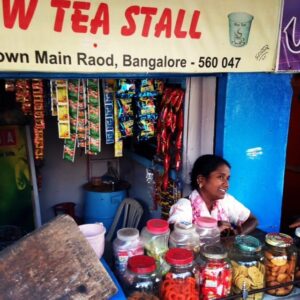“Collectively ladies management $36 trillion in GDP. That’s why ladies can’t be ignored.”
That’s how Bonney Tunya, CNBC Africa Anchor and moderator kicked off the “Financing Girls-Owned SMEs within the World Provide Chain” plenary session at Girls’s World Banking’s Making Finance Work for Girls Summit.
The panel featured Omokehinde Adebanjo, Africa Enterprise Head at MasterCard, Persistence Nambo, Gender Specialist at World Cocoa Basis, and Douglas Brew, Company Affairs and Sustainable Enterprise Director at Unilever. The panelists shared challenges, the worth proposition, and what non-public and public sector organizations can do to empower ladies within the international provide chain.
Discovering a brand new market via information
 Doug Brew from Unilever stated it begins with information. “Being conscious of what you’re doing as an organization is completely essential.”
Doug Brew from Unilever stated it begins with information. “Being conscious of what you’re doing as an organization is completely essential.”
5 years in the past, Unilever set very formidable targets associated to bettering the lives of ladies of their provide chain. Doug admitted that on the time, the corporate had little concept of the position ladies really performed, and their targets had been method off. Right now, because of information, Unilever has a lot better perception.
Doug sees the problem is discovered on the finish of the distribution chain, what he refers to because the “white house.” That is the place the merchants who’re shopping for and promoting Unilever’s merchandise are predominantly ladies, and the place entry to finance and credit score is a giant constraint.
Nevertheless, as he identified, the market potential is large.
“As soon as you know the way many ladies you have got in your provide chain; you notice the biases that run via each group and also you begin to notice you have got an enormous underplayed asset.” Doug went on. “Your means to achieve out and convey these ladies to a enterprise proposition is completely huge.”
Recognizing the chance, Unilever and plenty of corporations like them have taken ladies’s empowerment “out of CSR.” It’s now not one thing completed via a basis or on the aspect, however slightly as a core market of enterprise.
Model fairness via various sourcing
Persistence Nambo of World Cocoa Basis believes {that a} key limitation to empowering ladies within the provide chain is the shortage of farm financing options for smallholders.
“In Africa, the extent of contribution to the economic system by smallholders is 55%. But only one% of banking providers are directed towards agriculture merchandise, farmers, or agricultural companies. Smallholder are competing with a lot bigger companies for that 1%,” stated Persistence. “This poses an infinite problem, particularly for girls.”
However as Persistence shared, there’s a compelling enterprise case for serving ladies famers within the international provide chain. Customers as we speak are studying labels and are serious about “the story” of how their chocolate is sourced. For corporations, there’s great worth in having the ability to supply components from native and numerous suppliers, they usually can assure that provide by sourcing from ladies.
Commonplace working procedures: a barrier to ladies’s inclusion
Based on Omokehinde Adebanjo of MasterCard, along with the recognized identification and authorized land possession obstacles that forestall ladies from having collateral, schooling is a significant barrier for girls within the international provide chain. She identified the complexity in procurement instruments and contracting autos which might be tough for entrepreneurs with low stage of literacy to navigate.
So, what could be completed? The panel mentioned monetary and non-financial providers that allow ladies to be a part of the worldwide provide chain.
Options for an inclusive provide chain
 Omokehinde stated it’s about growing merchandise that make sense for girls, taking into account these legal guidelines and restrictions ladies face “simply by being ladies.” For instance, a grant from MasterCard helped a women-focused microfinance establishment in Nigeria develop an alternate credit score scoring product that enables them to attain ladies extra simply.
Omokehinde stated it’s about growing merchandise that make sense for girls, taking into account these legal guidelines and restrictions ladies face “simply by being ladies.” For instance, a grant from MasterCard helped a women-focused microfinance establishment in Nigeria develop an alternate credit score scoring product that enables them to attain ladies extra simply.
She additionally burdened the necessity to educate women at a younger age fundamental entrepreneurial expertise and find out how to use finance, one thing MasterCard is doing. “This fashion, younger ladies will know they’ve place in society that’s greater than being a mom, they could be a contributor to the economic system as effectively.,” including “It sounds easy, however it’s so impactful. You’ll be able to hint the ladies and see them make more cash for themselves and their households simply by getting fundamental instruments.”
Persistence added impression financing as one other method to ship options to ladies who’re in any other case excluded from conventional financing. “When ladies entrepreneurs strategy a financial institution, they’re requested two questions: ‘What do your monetary data appear like,’ and ‘do you have got a purchaser?’” stated Persistence. “As a startup or an SME, you want to have the ability to meet these specs.”
She burdened that doing enterprise in conventional methods excludes many women-owned enterprise. If corporations wish to safe a neighborhood provide enterprise, they should do issues otherwise, like being prepared to put aside the truth that ladies don’t have capital or collateral. Persistence believes that if they’ll see a historical past of competence, corporations ought to belief the ladies within the provide chain and know that if they provide her the assets, she is going to ship.
Doug Brew stated that past financing, one factor massive organizations can do is facilitate the partnerships which might be wanted to achieve ladies within the provide chain. “You can not flip to a world associate and anticipate them to function in northern Nigeria, you want a neighborhood associate.” Pulling these individuals collectively is an important position for corporations like Unilever.
He reiterated that corporations should additionally apply a gender lens to their insurance policies, in any other case there’ll all the time be a pure bias towards established suppliers. He pointed to Unilever’s technique paper “Alternatives for Girls: difficult dangerous social norms and gender stereotypes” to know how they do it.
Doug additionally addressed one thing a lot tougher to sort out: influencing structural modifications in broader monetary methods. “Let’s go for that house the place the regulation isn’t set, the place it’s versatile or rising, and let’s make it possible for earlier than its set in stone its getting in the best path,” he urged.
All of the panelists agreed there’s a position in partnerships with corporations and governments, and for corporations like MasterCard and Unilever to make use of their international scale to have an effect on change in focused methods.
“Challenges ladies face are cultural, political, typically non secular, issues they don’t have any management over. It’s our job to ensure these obstacles are eliminated. If now we have two billion un or underbanked, and we all know {that a} disproportionate quantity is feminine, you might want to take daring steps,” Omokehinde stated, including “Stage the enjoying area and watch us compete.”
To look at the total panel on “Financing Girls-Owned Companies within the World Provide Chain” take a look at the video right here.